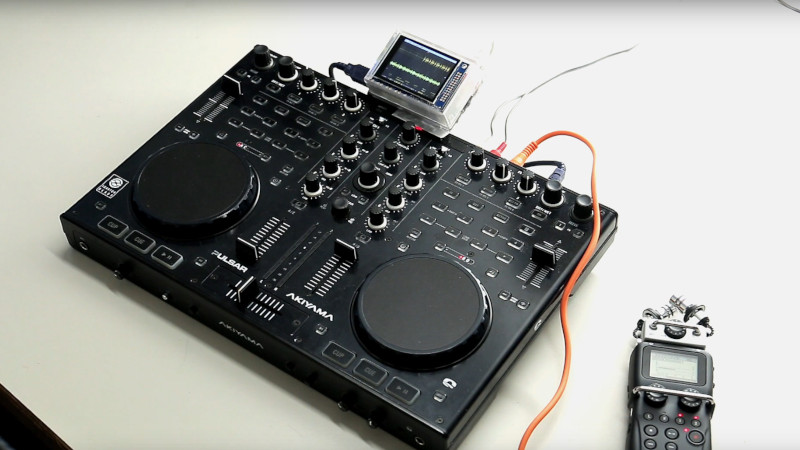There is a romance to notions of a byegone age of DJing — driving a pair of Technics 1200s dwarfed on either side by the stacks, pumping techno bass through the laser-tinged darkness into a hungry crowd. Even if the reality of early evening Saturday wedding parties playing inoffensive crooners for the 50-somethings didn’t really live up to it.
The trouble with DJing old-style was that it required extensive logistics to shift all that equipment not to mention a record collection, so the modern DJ for whom everything has gone digital is truly lucky in the scale of their operation. For some people even that is too much to carry, and [Dennisdebel] has minimised a DJ rig to the next level, by running the popular Mixxx DJing software on a Raspberry Pi hooked up to his DJ controller. You can see the result in the video below the break.
This is more of a HOWTO for installing a set of software packages on the Pi to achieve an aim rather than a special hardware hack, but as he points out the interest lies in regaining control of the process. The DJ space is dominated by commercial offerings increasingly laden with DRM and proprietary cloud offerings, so this represents a means of taking back control of the process. If it’s not hacky enough, you can always add a home-made DJ mixing station.
















I wonder if mixx support the various decks with LCD screens (numarks nv2, ns7’s , pioneers, denon) , that would be really cool, As a DJ myself I would love to see mixx grow but ultimately I use VirtualDJ 2021, the stems option is really cool.
Mixxx contributor here: We would to support displayed controllers but there are a couple of challenges involved. We currently do not have the option to make that available to the controller, but we are planning on supporting that very soon. The major issue is that we are a not a company with contacts or the money to buy expensive controllers like that just for the purpose of adding support for them. More over, almost all Controllermanufacturers are very secretive about how their hardware communicates. So adding support for feature-rich controllers is not only much more costly but also more time-consuming than it is for vendors for other commercial DJ software.
Nice reduction from lugging a laptop about I guess, the van was always going to be mostly full of speaker cabinets and amplifier racks though, unless you are playing to a room of people with mobiles and headsets via WiFi! I speak as an ex-sound engineer for many many bands and DJs, with fond memories of loading the van at 1am…
while everyone else partied we would be packing, looping xlr cables and noting what needed repair again, ahh the days of band work, I do miss them.
Yes, actually bringing out the audio into the room is the real challenge in terms of logistics.
Like its hard to make a subwoofer “small”, especially if it needs to fill an outdoor space.
Not to mention the rest of the sound gear.
And if one gets fancy, then there is also the light equipment, not to mention a stage.
Makes me remember back to a summer where I were sweating like a pig behind an LED wall, assembling it piece by piece on a crowded stage. (We had it suspended a bit out from the back “wall” of the stage, but due to the other people working on fixing other lights, there weren’t much space, so the whole video wall were squeezing me against the back curtain (that were black and brightly lit up by the sun, making it burning hot to the touch.) and the fence of the stage, not to mention that the LED wall were fairly old and weighed quite a bit. With hindsight, I should have removed the back curtain and stod on a stepladder on the other side of the fence.)
So a sound rack or two isn’t really that much to bring around if working on a larger event.
Though, going to a place where sound/light/video is already provided, then I can see the appeal in rolling in with only a backpack. And I don’t mind working with such people, some can though be a bit arrogant…
But I do have to wonder if a raspberry pi is a good option for audio mixing. Now, it has a fair bit of performance, so just mixing audio should be fine. But I know DJs that are loading whole audio libraries consisting of 10+ GB straight into RAM. (Or using SSD, seek times on HDDs aren’t always good enough and leads to unwanted “cut outs” during the performance. (Yes, its exceptionally rare, but highly unwanted, and do remember, we are reading multiple audio tracks in parallel.))
Not to mention that running a few synthesizers or the like can quickly eat CPU performance for breakfast, especially when one adds on a few effects on top.
I guess there might be a lot of situations where the venue provides the sound system but you’re expected to provide the inputs to that system?
Yes. In clubs or electronic music events where DJing is the norm, usually there is Pioneer DJ equipment and you go with a usb drive where have your collection prepared with Pioneer’s Recordbox software. So the bar or the event organizers have it there already.
But there are many situations where a DJ goes to some place with the equipment and the venue expects e.g. XLR output or just RCA to their mixer or something. For example if it’s a band thing but with DJs also, or if a DJ goes to a wedding or birthday or whatever. Nicely portable handy setups are great for many uses.